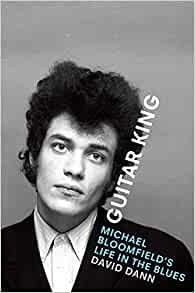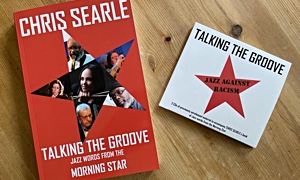Home » Jazz Articles » Book Review » Guitar King: Michael Bloomfield's Life in the Blues
Guitar King: Michael Bloomfield's Life in the Blues
 Guitar King: Michael Bloomfield's Life in the Blues
Guitar King: Michael Bloomfield's Life in the Blues David Dann
776 Pages
ISBN: #978-1477318775
University of Texas Press
2019
Through a combination of journalistic objectivity, scholarly attention to detail and the passion of a fan, author David Dann accomplishes exactly what he professes to achieve in his 'Prologue' to Guitar King. That is, his publication will ..."contribute to that worthy eventuality..." [whereby]..."[Michael Bloomfield will] assume his rightful place among those guitar players whose artistry has shared the evolution of American popular music and culture."
If nothing else, the writer has researched and assembled a a tome that does not fall prey to the bane of such biographies, i.e., rushing through the early history of the subject and limping to a conclusion during the latter-day, more recent segments. Quite the contrary, as Dann offers close to eight-hundred pages virtually all of which are worth equally careful reading. Even the play-by-plays of studio and stage performances, including the ill-conceived super-group KGB, conjure a palpable sense of suspense.
The main content efficiently educates on the timeline of the native Chicagoan's early existence in his native city, while the 'Notes,' Acknowledgments,' 'Other Resources,' etc., outline the scrupulous process by which the author assembled Michael Bloomfield's Life in the Blues. All that research by the man who acted as consultant on the superb audio/video compendium From His Head to His Heart to His Hands (Legacy, 2015) verifies the veracity of his storytelling. But it also substantiates how the writer renders such nuanced accounts of the comparatively low-profile and often idiosyncratic creative endeavors during Bloomfield's later years; he was rightfully proud of creating estimable soundtrack music for Steelyard Blues (Warner Bros., 1973) among others (including porn cinema!?)
More musicological than mercenary, it is this work by which Michael redefined the role of guitar hero for a generation. In his increasingly expansive projects such as the acoustic duets with Woody Harris, Bloomfield not only set himself apart from contemporaries such as Eric Clapton and Jeff Beck, but further honed his an already erudite approach. Many an acquaintance here speaks admiringly of Michael's sure grasp on the art of conversation, but he was one of those rare individuals who could revive the truth in cliche, in this case 'walk the walk and talk the talk,' in large measure because he had first-hand sources in the form of blues icons like Howlin' Wolf who would call him up on stage to play. Michael listened to plenty of recordings, but that pursuit was one of many he utilized to edify himself and hone his technique
The well-to-do, non-conformist Jewish boy's activities alongside Bob Dylan on Highway 61 Revisited (Columbia, 1965) and at the electric set at Newport Folk Festival the same years are unquestionably the stuff of legend. Yet, the sensitivity to particulars David Dann applies to the latter part of Michael Bloomfield's life---intimate residencies at the Old Waldorf in San Francisco, his instructional guitar album If You Love These Blues, Play 'Em as You Please (Guitar Player, 1976) and his otherwise quiet and largely solitary (by choice) existence in California— he's reliably making a case for the validity of his subject's declaration of independence from mercenary commercialism in favor of less mainstream but more honest pursuits. In the era of burgeoning rock stardom, the decision was as innovative on its own terms and as much of a deeply personal expression as anything else the man did during the course of a tragically short life.
Certainly, those activities are not so colorful as playing with the Paul Butterfield Blues Band, organizing and launching his eclectic, horn-propelled band, the Electric Flag, or collaborating with Al Kooper in the studio and on stage around Super Session (Columbia, 1968). But there's a sense of purpose in Dann's writing mirroring that of Bloomfield's and that makes Guitar King hard to put down once the reading starts and delivers a dual sense of melancholy and accomplishment when it's complete. That Michael's loquacious charm gave way to a decidedly more irascible nature in later years doesn't sour writer or reader on him, but only aids in completing a more true-to-life portrait of a man with an insatiable curiosity about and affection for music right down to its earthy root forms of folk, blues, country and gospel.
There's a memorable cast of characters populating Michael Bloomfield's Life in the Blues from its very beginning. And they're not all wholly famous names like Jimi Hendrix and Janis Joplin, despite the fact that, in the form of that aforementioned 'Prologue,' David Dann describes the first meeting between Dylan and Bloomfield. But the latter struck up relationships with the likes of Muddy Waters that were as much personal as professional . As a result, just like his connection with the Nobel Laureate from Minnesota had its own circular logic—Dylan called Bloomfield to sit in on a 1980 show in San Francisco—so did the mentor/student bond with McKinley Morganfield that resulted in Fathers and Sons (Chess, 1969).
The album that deliberately introduced blues to an whole new (read: white) audience also served as recognition of the influence its progenitors wielded over contemporary rock. And it's arguable that, once Michael Bloomfield decided he had no patience for what Joni Mitchell described as ..."Stoking the star-maker machinery behind the popular song..." his every endeavor was more rather than less devoted to the righteous elevation of the art of music and its artists. And except in those cases where he purposefully chose to defer to others, as on the Electric Flag's reunion album, The Band Kept Playing (Atlantic, 1974), his electric guitar playing was the most distinctive feature: without ever becoming incessantly frenetic, 'His Holy Modal Majesty' (so dubbed by Kooper) played strings of sweet notes, seasoned with a sting in an unerringly accurate reflection of his personality. That he also played piano with an informality befitting his self-image, as on Moby Grape's Wow/Grape Jam (Columbia, 1968), was a mark of a versatility that broadened with age to include the exotic stringed instrument known as the tiple.
Granted his business alliance with manager Albert Grossman led inextricably to his work with Janis after her split from big Brother and the Holding company. But Bloomfield saw and heard a kindred spirit in the aforementioned Texas chanteuse as she formed the Kozmic Blues Band, one just as vivid as the that which he also sensed in Buddy Miles; it was only natural to accommodate her needs as he (and keyboardist Barry Goldberg) sought the drummer/vocalist to accommodate his for the 'American Music Band.' And in one more in a series of Zelig-like occurrences, Michael encounters Duane Allman in the process of producing an album for Otis Rush: it's akin to a brush with his alter ego, as 'Skydog' went on to shepherd his Allman Brothers Band to success via leadership skills that Bloomfield never developed.
Relocating to California following his fling with stardom, Bloomfield's was a lifestyle grounded in personal value preference. Comprised of the occasional gig in between voracious reading, music listening and television watching, such an existence might well stand as the archetype for a healthy detachment from careerism, under ever-so-slightly different circumstances. In Michael's case, however, it did not carry with it a sense of purpose deep enough to withstand an inexorable dissipation, compounded by his chronic insomnia and substance usage. With his eventual concession to drinking, his support system slowly dissemled from its once stalwart membership including, among others, producer/business partner Norman Dayron, one-time spouse Susan Smith and romantic companion Christine Svane, plus loyal co-musicians such as keyboardist Mark Naftalin.
The near-terminal ennui only more deeply implanted depression that began to afflict Bloomfield earlier in life, so David Dann's theories about Michael's mental health issues become only more astute as this narrative progresses. Bloomfield's ambitions in life did not seem to include gaining the approval of a father who once committed his son for psychiatric evaluation, but to ratify the choice(s) he himself made in both vocation and avocation. Empathetic mother Dorothy prevailed upon B.B. King to speak with her son in the hopes of lifting the malaise of later years and this paradoxical family dynamic did not preclude Michael from beseeching Harold (successfully) for financial assistance around that same time
Compelling reading from start to finish, Guitar King contains its own sense of logic. In fact, as David Dann reasonably hypothesizes the circumstances of his subject's passing, he brings a palpable sense of closure to his chronicle of this truly progressive artist, if only because there's an intimation the musician had in fact completed his life's work by this time. Besides Michael Bloomfield's Life in the Blues (and perhaps the website from which it evolved), only this prolific artist's music itself could be a more vivid act of advocacy.
< Previous
The John Coltrane Home in Philadelphi...
Next >
Songs I Love
Comments
Tags
Book Reviews
Doug Collette
University of Texas Press
Eric Clapton
jeff beck
Howlin' Wolf
Bob Dylan
Paul Butterfield Blues Band
the Electric Flag
Al Kooper
Jimi Hendrix
Janis Joplin
Muddy Waters
Joni Mitchell
Moby Grape
Buddy Miles
Barry Goldberg
Duane Allman
Otis Rush
Allman Brothers Band
B.B. King
For the Love of Jazz
 All About Jazz has been a pillar of jazz since 1995, championing it as an art form and, more importantly, supporting the musicians who create it. Our enduring commitment has made "AAJ" one of the most culturally important websites of its kind, read by hundreds of thousands of fans, musicians and industry figures every month.
All About Jazz has been a pillar of jazz since 1995, championing it as an art form and, more importantly, supporting the musicians who create it. Our enduring commitment has made "AAJ" one of the most culturally important websites of its kind, read by hundreds of thousands of fans, musicians and industry figures every month.























